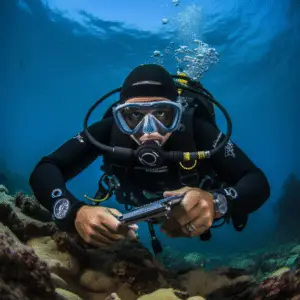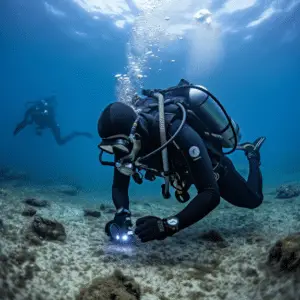Dive certification isn’t just a one-time deal. You need to keep up with the maintenance and improving your skills. But how?
Practice is the key! Participate regularly in diving activities. Go for guided dives, join dive clubs or organizations, explore new underwater environments. All these experiences will help you become a better diver.
Also, stay updated with the latest advancements in diving tech and techniques. Attend workshops, seminars, or online courses. This continuous learning will help you adapt to new conditions and improve your diving abilities.
A tragic incident serves as a reminder of why regular maintenance of dive certification and skills is so important. An experienced diver who hadn’t been diving for 10 years went on an expedition without proper training. He struggled to handle unexpected underwater conditions due to lack of practice.
Remember, maintain your dive certification by practicing regularly, learning continuously, and staying up-to-date with the diving industry. Investing time and effort into honing your diving abilities will help you have safe and enjoyable experiences beneath the waves.
Importance of maintaining dive certification and skills
Why is it vital to update and upgrade diving abilities? Maintaining dive certification and skills is critical for divers, guaranteeing their protection and capability in the underwater world. Here are some reasons why:
- Guarantees Safety: Keeping dive certification and skills up-to-date allows divers to understand the newest safety methods, use of equipment, and emergency techniques.
- Improves Expertise: Regular training helps divers sharpen their approaches, enabling them to administer tricky situations while discovering new dive spots.
- Extends Exploration Possibilities: Staying current with their skills gives divers access to more dive sites and underwater exploits around the globe.
- Increases Self-assurance: Constant practice grows assurance in diver’s capabilities, leading to tranquil dives and better appreciation of the underwater environment.
- Encourages Ongoing Learning: Keeping certification spurs divers to pursue additional education in specialized fields like deep diving or underwater photography.
- Creates a Divers Community: The pursuit of staying certified creates bonds with other divers through shared experiences, training sessions, and dive trips.
Also, individuals who are proactive in maintaining their certification show commitment to responsible diving practices. They understand that the oceans must be safeguarded and pledge to maintain a high level of knowledge and skill.
Pro Tip: Take refresher courses or more advanced courses regularly to constantly challenge yourself and widen your diving knowledge.
How often should you practice diving skills?
It’s crucial to practice diving skills to keep your certification and stay sharp. But how often? Three points to consider:
- Consistency is key. Regular practice builds muscle memory and keeps proficiency. Aim for consistent practice throughout the year.
- Frequency. The more you dive, the better you become. Plan frequent diving trips to up your skills and confidence. You can also keep up with the latest techniques and equipment.
- Refresher courses. Take refresher courses every few years. Learn new techniques and brush up any forgotten skills.
Practice sessions depend on needs, experience, and goals. Assess performance to decide how often to practice.
Pro Tip: Keep a logbook of all dives. Note the skills practiced each session. Track progress and identify areas needing attention.
Tips for maintaining dive certification and skills over time
Scuba diving is an awesome experience that needs expertise and official recognition. To keep your dive certification and abilities up-to-date, think about these tips:
- Learn more: Take more advanced scuba courses to increase your knowledge.
- Practice: Frequently dive, either in a pool or open water, so you can better your skills.
- Keep fit: Exercise regularly to improve your endurance and make sure you’re ready to dive.
- Care for your equipment: Follow the right methods for cleaning and storing your gear.
- Be part of a group: Connect with experienced divers in clubs or discussion groups to get info from them and stay motivated.
Also, always prioritize safety by keeping up with the newest diving regulations and instructions. Remember, keeping your dive certification isn’t just about being certified; it’s an ongoing dedication to polishing your abilities and going deep into the incredible underwater world.
Now is the time to take action! Don’t let your worries of missing out on amazing diving chances hold you back. Remain committed to maintaining your dive certification and abilities so you can explore new depths, witness stunning marine life, and create unforgettable memories. Enjoy the adventure underneath the surface!
Common challenges in maintaining dive certification and skills
Certified divers face many obstacles when it comes to preserving their skills. Here are the common ones:
- Time issues. Busy lives can make it hard to get regular diving practice.
- Access to dive sites. Especially for those living far from the ocean.
- Finances. The cost of gear, traveling and guided dives can be too much for some.
- Physical fitness. To stay in shape and stay safe.
- Risk management. Staying up-to-date on regulations and risks.
- Learning needs. New techniques, equipment and underwater environments make continual learning necessary.
To counter these challenges, divers can turn to virtual reality sims or online courses. Joining local clubs or organizations also helps.
It’s worth noting that, according to PADI, 1 million people get certified yearly. This shows how important it is to maintain certification and skills for all divers.
Overcoming challenges and staying motivated
- Set objectives for yourself – aim for a certain number of dives or learn a new skill. This will keep you focused and motivated.
- Stay connected with the diving community – get support and encouragement from fellow divers, and learn from others.
- Explore new dive sites – this will keep your diving journey new and exciting, warding off boredom and burnout.
- Continue your education – take advanced courses or specialty certifications to build your knowledge and challenge yourself.
- Maintain a regular diving schedule – consistency is key in preserving your skills. Plan regular dives to stay in practice and progress.
- Stay physically fit – exercise and healthy nutrition helps you be strong and full of energy underwater.
- Plus, join dive trips or attend dive events – these can provide extra motivation while allowing you to explore new environments.
- Finally, keep a logbook – track your accomplishments and remind yourself of all the amazing adventures you’ve had!
Conclusion
Scuba diving is an exciting activity! To stay certified and sharp, you must practice and keep up with updates. Participating in diving trips helps you refine abilities and gain more experience underwater. Additional training courses or workshops will boost your fluency in diving techniques and increase confidence.
Remember: staying physically fit is significant. Workouts that improve cardiovascular endurance, strength, and flexibility will positively affect diving performance. Plus, staying aware of the latest tech advancements in scuba gear is key. This will ensure safe and enjoyable dives.
Moreover, joining a scuba diving club or community is hugely beneficial. It connects you with other passionate divers. Group activities like clean-ups and conservation projects not only hone skills but also foster camaraderie.
Ultimately, staying certified and skilled requires commitment, learning, physical fitness, equipment awareness, and connecting with the diving community. Incorporating these elements into diving routines helps keep skills sharp. For example, Scuba Diving Magazine’s 2021 Gear Guide edition states that tech advancements have led to lighter yet more durable materials in scuba gear manufacturing processes.
Frequently Asked Questions
Q: How often should I refresh my dive certification?
A: It is recommended to refresh your dive certification every 1-2 years. This allows you to stay updated with the latest diving techniques, safety procedures, and equipment advancements.
Q: What are some ways to maintain my dive skills?
A: To maintain your dive skills, you can participate in regular dive trips, join diving clubs or communities, and continue learning through advanced dive courses. Regular practice in the water is essential to keep your skills sharp.
Q: Can I practice my dive skills without being certified?
A: It is strongly advised to have proper certification before attempting any dive skills. Certification ensures that you have received proper training and understand the safety protocols associated with diving. Without certification, you may put yourself and others at risk.
Q: Are there any online resources to help me maintain my dive certification?
A: Yes, there are various online resources like dive forums, websites, and videos that provide valuable information and tips for maintaining your dive certification. However, online resources should never replace practical training and practice in the water.
Q: Are refresher courses available for certified divers?
A: Yes, many dive centers offer refresher courses specifically designed for certified divers who haven’t dived in a while. These courses help you regain confidence, brush up on your skills, and ensure you are up to date with safety procedures.
Q: What can I do in between dives to improve my diving skills?
A: Between dives, you can engage in activities like snorkeling, swimming, and practicing breath-holding exercises. These activities can improve your overall aquatic skills, confidence, and comfort in the water, which will benefit your diving abilities.


